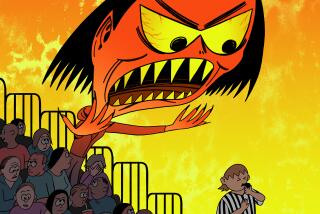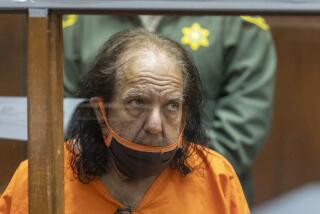Ballplayer, 13, Convicted of Fatal Beating With Bat
- Share via
In a tragic case that put a spotlight on youth sports conflict, a judge in Juvenile Court on Friday found a 13-year-old Palmdale boy guilty of second-degree murder for killing a 15-year-old with a bat after a Pony League game earlier this year.
The ruling caps a case that rattled suburban Palmdale and raised questions about the increasingly contentious nature of youth sports, largely because witnesses said the victim had taunted and bullied the boy about losing a game.
The boy said he hit the teen twice with a bat -- in the knees and then in the head -- because he feared the older boy was about to beat him up.
But in a stern rebuke to the young defendant’s self-defense argument, Los Angeles County Superior Court Judge Richard E. Naranjo said the boy had chances to avoid the tragic outcome, no matter how vigorous the youthful gibes.
“There’s no controversy about the teasing and the shoving,” Naranjo said of the boys’ argument in front of a ball field snack bar. “But when the opportunity was there to avoid further confrontation, [the defendant] did not take that opportunity.”
The boy, who cried as he hugged his parents after the verdict, will be sentenced by Naranjo on July 28.
Palmdale Councilman Steve Hofbauer said the death of Jeremy Rourke cast a cloud over competitive youth sports.
“You can’t take the competition out of this, because I don’t care where you are, life is competitive,” Hofbauer said. “But we have to learn how to channel that competitiveness appropriately. There’s a way to be a victor gracefully, and there’s a way to maintain dignity when you lose.”
After their son’s death, Jeremy’s parents issued a statement underscoring their belief that the boy who killed him “was not a monster.”
“He was a good boy who made a bad mistake,” wrote the Rourkes, who said they started an anti-violence youth sports foundation after Jeremy’s death. “This is a mistake that will haunt both families for the rest of our lives.”
The defense attorney said his client was a good student who had no prior contact with law enforcement.
But on Friday, Jeremy’s father said he thought the defendant should get the maximum sentence, which would be 12 years.
Under California law, he can be imprisoned at the California Youth Authority until age 25.
“To me that’s justifiable because he’ll be able to get out when he’s 20-something and still carry on with the rest of his life,” Brian Rourke said outside of the courtroom. “I’m happy that justice was served, but it doesn’t bring my son back. No matter what, my son is gone.”
League officials said the incident reverberated beyond the confines of the local diamond and the city.
“Everybody in our league was affected by this, and everybody in leagues around the country was affected by this,” said Pony League President Ken Curtis. “It was eye-opening to see what can happen in a very innocent place. It’s unfortunate how an event like this can take place anywhere.”
Although the 13-year-old is black and Jeremy was white, and the Antelope Valley has been the scene of racially motived crimes, parents, prosecutors and the defense said race did not play a role in the confrontation.
In court, the defendant testified that Jeremy used a racial epithet, but the 13-year-old boy earlier told police that he did not interpret it as a racist comment.
Defense attorney William McKinney said Jeremy addressed the defendant by the slur “in a rapper kind of way.”
The blowup at the diamond occurred April 12 after one of the night ballgames that have bonded residents of this fast-growing suburb of 116,000.
The 13-year-old boy’s previously undefeated team, the Angels, had just lost its first game of the season to the team with the league’s worst record. In court testimony, witnesses testified that Jeremy had teased the boy about the loss.
Jeremy, who was 5-foot-10 and 190 pounds, towered over the younger, 5-foot-1, 90-pound defendant.
Jeremy had been a Pony League player and was a junior umpire. He was at the ballpark that night to help his sister at the snack bar and to watch a younger brother play.
Four of the 13-year-old boy’s former Pony League teammates testified that Jeremy pushed the smaller boy. Then the defendant retrieved an aluminum bat from an equipment bag, removed a protective sock and swung at Jeremy.
In court, defense witnesses testified that Jeremy was well-known in the Pony League for his explosive temper. Former coach Willy Tonkin said Jeremy “was a bully.”
Tonkin testified that about a year ago, Jeremy was so upset at being walked by the pitcher that he threw his bat at least 50 feet toward third base and “flipped off” the umpire with both hands when he was ejected.
He also testified that Jeremy punched another coach. As a result, he was kicked off that year’s all-star team at the end of the season.
However, under cross-examination, Tonkin, the head of the Pony League junior umpire program, acknowledged that he found Jeremy fit to be an umpire for the younger children.
He also agreed that Jeremy was not unique in some of his angry reactions and that other boys had thrown helmets in anger.
“To some kids, winning is everything,” Tonkin said.
On Friday, Tonkin said some people had objected to Jeremy’s being a junior umpire and the league was trying to have him removed.
But others felt his earlier blowups were mitigated because they happened in the heat of competition.
“I’m not going to tell you this is not a competitive league,” Tonkin said. “But it’s not more competitive than any other league I’ve seen in the last 10 or 12 years.”
After the verdict, Jeremy’s father said it was “a little hard” to hear his son called a bully.
“But I know the truth, and so it didn’t really bug me,” Rourke said.
The father, who wore a T-shirt with a silk-screened picture of Jeremy, said he was hurt that bystanders did not step in to stop a confrontation he called an instance of “sports rage.”
“People were standing around and not doing anything,” said Rourke.
Some parents said they asked themselves the same question -- whether the tragedy could have been forestalled -- given the many people who said they watched the attack.
“But people said it all happened so fast, there’s no way they could have stopped it,” said Kelly Unger, the parent of a 12-year-old Pony League player and a friend of the Rourkes. “Nobody’s ever going to know exactly why it happened and whether anyone could have stopped it.”
Others said the real question was why adults haven’t intervened to stop a national epidemic of excessive competitiveness that all too easily escalates into violence.
“I think society’s got to take some blame on this. It’s not just the kids,” said Gary Stowe, a Lancaster resident whose children once competed in youth sports. “Some of the kids who are troublemakers are the best players, and coaches want to keep them. I’ve seen kids throw bats at people ... and coaches say cut it out instead of kicking them out of the league.”
Some parents said there were simply no winners in the case.
“Our closest friends were drawn from that baseball league,” said Kurt Unger, Kelly Unger’s husband. “It’s just a tragedy, one of those unexplainable tragedies. There’s only one person who knows why, and somebody would need to get inside the head of a 13-year-old kid to get an answer.”
More to Read
Go beyond the scoreboard
Get the latest on L.A.'s teams in the daily Sports Report newsletter.
You may occasionally receive promotional content from the Los Angeles Times.











